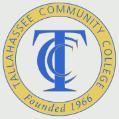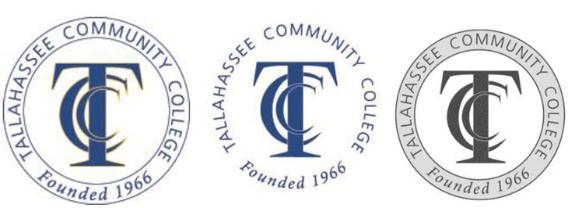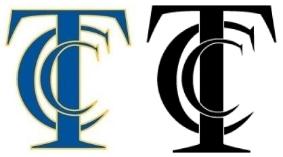A brand is more than a look or logo. The TCC Identity and Branding System represents the sum of all visual impressions associated with the College that express our mission and create an impression on the viewer. These include, but are not limited to:
Logo – The official symbol and primary identifier of Tallahassee Community College
Icons – Images that represent specific departments, divisions or programs within the College that have a unique message targeted to a specific audience
These impressions and other images and graphics extend to College stationary, collateral materials, publications, signage, vehicles, digital displays, banners and anywhere else the College logo or icons are used. The policies and standards outlined in this document will streamline the overall effort for image unanimity between these mediums.
Brand Guidelines
Official Colors
| Blue | Gold |
|---|---|
|
Web Palette RGB #005296 |
Web Palette RGB #e5b611 |
|
Printing Palette PMS287u (Uncoated Paper) PMS287c (Coated Paper) CMYK: 100/69/0/11 |
Printing Palette PMS110u (Uncoated Paper) PMS110c (Coated Paper) CMYK: 2/22/100/8 |
Official Logo

The official TCC logo, the official symbol and primary identifier of the College, is the “seal wheel” version, which features TCC Blue and TCC Gold colors, a white inner circle background, and the signature interlocking letters within. This version was designed and adopted in 2005. This is the preferred logo and may be used in addition to department or event logos. It should be placed in a position of prominence on an official document, graphic, or publication.
Acceptable Logo Variations
Acceptable variations of the seal wheel are all TCC Blue, TCC Gold, navy, white, black, or grayscale, depending on the design needs of the collateral.

Additionally, the “interlocking letters” is suitable for more informal usages

Obtaining Authorization to Use the Logo
Use of any TCC logo must be approved by the Vice President for Communications or their designee. Permission is granted solely for the designated project. Use of the logo on any other product or merchandise or on any externally produced material requires additional approval.
Permission to use the logo may be revoked at any time at the discretion of the President or Vice President for Communications.
Authorization for Departmental/Project Branding
Logos or other branding for individual College offices, departments, departments, events, or initiatives must be requested through the Office of Communications and Marketing, and approved by the Vice President for Communications.
Logo General Use Guidelines
For readability purposes, the seal wheel should always be at least one inch in diameter or larger in all print publication uses. If the item requiring a logo is too small to incorporate a one-inch seal wheel, the interlocking letters may be used. When the interlocking letters are used, the document must also include, “Tallahassee Community College” spelled out. When designing for digital publication, the logo should always be large enough for the letters to be easily readable.
To prevent visual crowding, the logo should be surrounded on all sides by clear space where no other graphics, rules, typography, or other elements are present. As a general rule, this clear space should equal one-half the height of the logo.
The logo may not be modified, rearranged, warped (the proportion or aspect ratio changed from its original specification), partially obscured, superimposed, or otherwise customized without prior approval. This includes changing the typeface or using an unapproved color combination.
Use of discontinued or retired logos is prohibited.
Failure to comply with any general use guidelines may result in permission to use the logo being revoked.
New Logo or Icon Development Procedure
A new logo for the College must be initiated in the Office of Communications and Marketing and approved by the President. The proliferation of logos at TCC in recent years has eroded the brand identity and definition. Contact VP Candice Grause with any questions.
Applications
Stationery/Business Cards
TCC letterhead, envelopes, note cards, and business cards should be used for any and all official correspondence and communications.
To maintain consistency, business cards must include name, title, department, College name, College address, official College logo, office phone number, location, e-mail address, and TCC’s Web address. Cell phone numbers are optional.
All stationery items must follow brand, design, and style guidelines.
Using the College Letterhead StationeryFor more specific writing guidelines, refer to the TCC Style Guide.
E-mail Signatures
Employee and departmental email signatures should be standardized to help provide consistent institutional identity. To maintain consistency, user signatures must include name, title, department, College name, and official College logo and/or other approved graphics. The College address, office phone number, and the TCC or departmental web address are optional.
Links to professional profiles such as LinkedIn are permitted as long as the profile information is related to the user’s position at the College and does not promote any other business or affiliation. Non-College-affiliated text, links, or graphics are prohibited.
The College will automatically insert the following Public Records advisory on email messages sent by all employees:
***Due to Florida's very broad public records law, most written communications to or from Tallahassee Community College employees regarding College business are public records, available to the public and media upon request. Therefore, this email communication and your response may be subject to public disclosure.***
The College will also automatically alert employees when they receive an email that originated from outside the College:
CAUTION: This email originated from outside of the College. Do not click links or open attachments unless you recognize the sender and know that the content is safe.
Social Media Guidelines
Social Media at TCC
Tallahassee Community College uses social media to connect and engage with a variety of stakeholders, including prospective students, current students, employees, alumni, and the community. Through social media, the College can create an engaging online community where users can connect and stay informed on all the latest news, events, issues, accolades, and programs.
This Social Media procedure sets forth requirements and guidelines for staff, faculty, and students regarding the use of social media platforms to represent TCC, as well as faculty, staff, and students who wish to utilize social networks to encourage engagement at the College. This can include, but is not limited to, managing content on official TCC social media channels (includes departmental accounts), incorporating social media into the classroom experience, or developing an online presence for a student organization.
All official TCC social media efforts are managed by the Office of Communications and Marketing. The office also retains the authority to deactivate any College-affiliated social media account that violates the guidelines herein.
Social Media Terms and Conditions
All users of TCC-affiliated social media accounts must adhere to each platform’s terms and conditions. Not following these rules may lead to the suspension of the account by the social media company.
Representing TCC Through Social Media
Purpose of Social Media at TCC
TCC currently maintains official accounts on a variety of social media platforms. These social media are secondary information sources and are intended to supplement, not replace, College press, news, events, announcements, and student communication overseen by the Office of Communications and Marketing. TCC’s website serves as the primary official online information source.
Representing TCC Through Social Media
Any and all TCC-affiliated social media accounts must be approved by the Office of Communications and Marketing before they are created.
Once approved, the social media account must be created using a general College email address, not an individual email address, and passwords must be on file with the Office of Communications and Marketing.
All aspects of account and site management, including responsibility for monitoring of content, reside with the unit responsible for the account. At least two account administrators must be designated. Account administrators are responsible for creating content, monitoring comments and messages, and ensuring compliance with College policies. These individuals should not be temporary workers, interns, or work study students.
Communications and Marketing staff are available to guide individuals through the profile creation process and to provide expertise on setting up all the necessary information. If further support is needed, they can also be added to select social media platforms to help manage and monitor activities.
Social Media Checklist
Before creation of a new social media profile can be initiated, make sure the time will be well spent by answering the follow questions:
- Responsibility – Who will handle the day-to-day operations of maintaining and monitoring a social media profile? Will they have the skills and time needed? (When possible, AVOID relying on students for this role.)
- Goals – What is it you hope to achieve through social media? And who will be your audience? What are your plans for how to reach out to those people?
- Content – What will be your strategy for developing meaningful, dynamic content that gets the conversation going? Do you know how often to post and when to post?
- Listening – Social media isn’t just about producing content, it is about becoming a consumer of content as well. Administrators should be listening to both the feedback of their target audience and for inspiration from industry experts. Has time and manpower been allotted to this purpose?
- Tools – Have you chosen which social media(s) you will be using and why?
- Adjusting – Some posts are good, some are not. Are you prepared to make necessary adjustments to what you post and when you post it?
- Strategy – Have you created a strategy that outlines the who, what, when, where and why of your campaign?
- Approval
Managing Content
TCC’s official social media efforts are managed by the Office of Communications and Marketing. Divisional social media profiles and accounts are also guided by the Office. As TCC has a broad audience keeping in touch with the College via social media, be sure to notify the Communications Office upon creation of any new profile so that content and brand continuity can be monitored.
Communications personnel are also available to walk you through the profile creation process and to provide expertise on setting up all the necessary information. If further support is needed, representatives from the Communications Office can also be added to select social media sites to help monitor activities.
Electronic Communications Policy Guidelines
Social media usage at TCC is governed by the same policies that regulate all other electronic communications, including the Identity and Branding Standards. For additional guidelines and information, please read and review the following guidelines.
Best Practices
This section applies to those posting on behalf of an official College account, though the guidelines may be helpful to anyone posting on social media in any capacity.
- Protect the institutional voice. Posts on social media platforms should protect the College’s institutional brand by using a professional but friendly tone and good judgment.
- Strive for accuracy. Get the facts straight before posting them on social media. Care should be taken not to mislead or exaggerate information in a clickbait manner or in ways that could be considered spam.
- Quality matters. Correct spelling, punctuation, and grammar are of the utmost importance, regardless of the platform. Make every effort to be both clear and concise. Common abbreviations for specific words may be used (Prof. for Professor) but words should never be abbreviated using numbers (gr8, b4). Remember that internal acronyms mean nothing outside of the College or the higher education community, so consider spelling out those that are uncommon.
- Be respectful. Understand that any piece of content on a social media platform could encourage or result in negative comments or discussions of opposing ideas. Responses to such comments should be considered carefully in light of how they would reflect on the College in its institutional voice as well as the subject of the content itself.
- Remember your audience. This includes prospective students, current students, faculty and staff, members of our community, and members of the higher education community. Consider this before publishing to ensure the post will not alienate, harm, or provoke any of these groups.
- Make your content accessible. It is important to create accessible content. #CamelCase your hashtags so that assistive technology can interpret each word. Never rely on autogenerated captions, as they always need edits. When designing graphics, check color contrasts and combinations, keep text minimal, and consider typeface legibility and readability.
- Mobile-first. While most of us work primarily on a desktop or laptop computer, 80 percent of social media is consumed on mobile devices. Always check your content on a mobile phone to make sure it is sized and displaying correctly.
- Original Content. Any photos or videos uploaded to the social media platforms by administrators must be original works produced by the College, TCC students, faculty, or staff, or be used with the express permission of a third party with credit to prevent copyright infringement.
- Consistent Monitoring and Interaction. Account administrators should monitor the content and comments posted on all social media platforms as frequently as possible. Respond to comments. Engaging with audience members will make the content more valuable to them and keep them coming back.
- Tag and Link. Tagging and linking people and organizations is a great way to make connections with the TCC community and beyond. Tags and links must be relevant to TCC and its mission, or the person or group being featured. Connections highlighting business partnerships are encouraged.
Community Commenting Guidelines
TCC welcomes comments on our social media posts, but expects conversations to follow the rules of polite discourse and asks that participants treat each other with respect. The College reserves the right to delete any comments on official or affiliated accounts that are off-topic, containing links to third-party websites or content, deemed inappropriate, or made in violation of College policy, or state or federal law.
Policy Guidelines
Social media usage at Tallahassee Community College is governed by the same policies that regulate all other electronic communications which are located under the Identity and Branding System. For additional guidelines and information, please read and review the following policies.
Content Development
Content is the text and media that make up social media profiles, and development is the engine behind it. Collectively, content and its development represents and gives voice to the TCC brand and mission.
All content should:
- be accurate
- be active, up-to-date and posted frequently
- grammatically correct
- appropriate for a general audience
- relate directly to TCC, the College's mission, post-secondary education, campus activities, or other matters pertaining to education or life as a TCC student, faculty, staff or alumni
- have a clear, concise and authentic voice
All content may not:
- promote individual opinions or causes that are not directly related to the College
- infringe on any copyright laws or be posted without permission from the owner
- contain anything obscene, explicit, threatening or offensive
Photos and Videos
Any photos or videos uploaded to the social media platforms by administrators must be original works produced by TCC, or TCC students, faculty or staff, or be used at the express permission of a third-party and give credit to them to prevent copyright infringement. Photos and videos should also adhere to the content development guidelines.
Campaigns and Contests
Social media allows for extraordinary outreach through contests and campaigns. If you are considering creating such a promotion, please contact the Communications Office for further guidance on official rules and legal compliance.
Monitoring
Administrators should monitor the content posted across the social media platforms as frequently as possible. TCC encourages user interaction on all social media platforms. However, the College reserves the right to review and remove any site content or user content at its sole discretion, without notice, if it is considered inappropriate or violates TCC’s policies or the Student Conduct Code.
Connections
Linking or subscribing TCC’s pages to other pages is a great way to make connections to other individuals or organizations in our community and beyond. Any connections must be relevant to TCC, the community college mission, or College-related. Connections with business partnerships are also permitted.
Personal Social Media Related to TCC
Balancing personal and professional social media can sometimes be tricky. Keep these two presences separate as much as possible by keeping all non-work related on your personal page.
Please note that employees may not share proprietary College information, copyrighted material, or make inappropriate comments as a College representative. Always remember that as an employee, you are legally responsible for your postings. Also, protect yourself and your privacy by not posting information that is too personal on a publically-accessible site.
Finally, personal social media usage should not interfere with your work responsibilities. Spending an excessive amount of time using these sites during work hours can severely inhibit your ability to do your job and could lead to disciplinary action. Use your common sense.
Web Guidelines
Permissions
Each department may designate one or more employees as a “content manager” for the TCC website. These content managers are responsible for maintaining portions of the website and must schedule training with the Office of Communications and Marketing’s web specialist before they are authorized to edit or create content. Those with permission to edit TCC’s website may not share their login information.
Accessibility
All websites and information maintained by TCC are required to be accessible to all users, including those with visual, hearing, or cognitive disabilities.
General recommendations for accessibility include the following:
- Ensure that the pages can be easily navigated;
- Provide clear and uniform site navigation features;
- Include alt text descriptions in all photos;
- Avoid the use of graphics or images with words; and
- Use simple, clear language.
Text Standards
Using AP Style
TCC follows the Associated Press Stylebook, the standard for grammatical guidelines used by the media. Here are a few essential tips for writing in AP Style:
- Commas and periods always go inside quotation marks.
- Spell out numbers zero through nine and use numerals for numbers 10 and larger.
- For writing out the time, do not use zeros and the descriptors should be abbreviated with lowercase letters. So 11 a.m. is correct and 11:00 AM is incorrect.
- For specific dates abbreviate the month: Tuesday, Dec. 10.
Additional Style Tips and Rules:
- Format for phone numbers: (850) 201-0000.
- Format for emails: Firstname.Lastname@tcc.fl.edu and include a hyperlink.
- Avoid: &, overuse of italics, and using abbreviations without explaining their meaning.
Writing for the Web
The average website user does not read every word on the page but instead skims the content. It is crucial to use clear and concise language.
- Use bulleted or numbered lists.
- Use meaningful headlines and sub-headlines to break up your content and make navigating the information on the page easier.
- With headers use title case, be specific and concise, and do not use them back to back.
- Minimize the length of your copy by about half of what you would include in a print piece or email.
- Make links informative. "Learn More' and 'Click Here' tell the user nothing and creates an accessibility issue for anyone with visual impairments using a site reader. Instead describe the function of the link: "Learn About Student Life" or "Click Here to Complete the Interest Form".
- Do not underline, italicize, or bold your text. Links will underline themselves..
Consistency of Language
Consistent language across the website is a key element in improving the user's experience and strengthening the TCC Brand. Here are some best practices for ensuring consistent tone and voice:
- Use an active writing voice and strong verbs.
- Active: He used a pencil.
- Passive: A pencil was used by him.
- Use plain language and short sentences, and avoid using industry jargon. Keep your audience in mind while writing. The average person reads at a 7th-9th grade level and will lose interest in language that alienates them.
- You can use either first, second, or third person, but chose one voice for your content and stick to it.
- When in doubt, read your writing out loud to help yourself catch mistakes or odd phrasing.
Graphic Standards
Images and videos increase user interaction with a webpage and improve user experience, but standards of accessibility, quality, and file size must be followed by all Content Managers.
- Every website image must be saved as a jpeg and be no larger than 500kb.
- Do not use clip art, animated images, or memes.
- Do not use images with text, such as flyers or informational graphics.
- These are not accessible to users who rely on sight readers.
- Crop and scale your images to fit the page or content types.
- Do not cut off people's faces, zoom too far into an image, or use images with watermarks.
- Keep images up to date by reviewing them at least every 6 months.
Imagery Do's and Don'ts
Do:
- Make it bright.
- Make it welcoming.
- Make it appealing to a broad audience.
- Make it representative of TCC's diverse community.
Don't:
- Use blurry images.
- Use dark or shadowy images.
- Add text to an image.
Media Library Use
Terminal 4's media library houses all of the digital files on TCC's website. It is the responsibility of the Content Managers to add new, up-to-date, files and to remove or delete old files. The media library is not for storing all of the media from your department and should only contain the files actively on the website.
Here are a few tips to keep in mind while using the media library:
- When adding an image or file include an alt/descriptive text. This makes the media accessible to site readers.
- Add media to your department's folders and not to the general "Categorized" folder double-check what folder you are in when looking for media you've previously added.
- When you insert an image onto a webpage, double-click the image and add a 15px padding (see below) to keep the format of the page neat.
Photography Guidelines
Policies
The College has a need for photographs for use in employee and student records, as well as College publications, general public information, and marketing materials.
Whenever possible, a recent photograph should be obtained from each employee and student upon joining or enrolling at the College. The photo shall be kept on file in Workday to facilitate record-keeping and identification (ex. College identification cards).
For all other photographs, the College’s campus and events are open to the public and as such group photographs and general event photography may be used for archival purposes and/or internal and external communications by the College. This includes public relations and social media. Commercial use of photographs of individuals for marketing purposes must have approval of the student and/or staff member. This permission can be obtained through the Photo Release Form available on the TCC website or from the Office of Communications and Marketing.
Photo Request Form
Names and images are often used in TCC publications, including print, radio, television, and the Web, to help convey promotional messaging of our College. Any individuals whose name or image is used for publicity purposes must sign a Photo release form before the College can use, reproduce and circulate their information.
Please email TCC Communications and Marketing at communications@tcc.fl.edu with any questions related to the use of the TCC photo release form.
News Media Guidelines
Public Information Officer
The Vice President for Communications serves as the College’s Public Information Officer (PIO) and the primary point of contact with the news media. The PIO or their designee is responsible for:
- Requesting media coverage through press releases, media advisories and/or press conferences regarding College activities or changes are of public interest or importance;
- Being readily available to media representatives;
- Providing news media representatives, upon their request, with all facts that give a true picture to the best of their knowledge;
- Requesting that news media representatives not publish or broadcast any facts which are injurious to College employees or students, or which would serve no constructive purpose; and
- Protecting College employees and students from any unnecessary demands on their time by news media representatives.
Employee Guidelines
In order to maintain a coordinated program of public relations for the College, it is essential that employees not provide information or an interview requested by representatives of the news media without prior approval of the Office of Communications and Marketing who will either set up an appointment for this purpose or speak to the media representative about the matter directly.
In cases where there is doubt with regard to privacy, but where it is felt that the publishing of the photograph serves a purpose which is in the best interest of the College, the communications representative will not authorize the use of the photograph without first obtaining a release from the individual(s) concerned.
Student Guidelines
Students are not permitted, during class hours or on College property, to provide information about College activities or an interview to representatives of the news media without prior approval of the College communications representative who is to be present at all such meetings with news media representatives.
Reverse Advertising
Procedure for Non-College Entities General Guidelines
This procedure applies to all non-College entities, including businesses, groups, organizations, teams, or other outlets, that wish to display or distribute any form of advertising, both paid and free, products, services, and/or messages on College property.
Reverse Advertising Procedure for Non-College Entities General Guidelines
The President delegates authority to approve advertising from non-College entities on College property to the Vice President for Communications.
Non-College entities are prohibited from advertising on College property without prior approval from the Vice President for Communications. This includes the posting of fliers, posters, pamphlets, etc., or promoting business establishments or services.
The College considers the following factors before approving advertising from a non-College entity:
- It is minimally intrusive and does not excessively divert attention from the primary information communicated by the College;
- It does not convey an endorsement by the College of a third-party product or service (the College reserves the right to require a disclaimer be used to clarify that the College does not endorse a product or service if necessary);
- It does not conflict with the image the College seeks to project;
- The sponsor has a good reputation in the community or in its industry, and its mission, values and business practices are consistent with those of the College; and
- The discretion of the President.
Advertisements on College grounds or facilities will not be accepted for:
- Alcoholic beverages
- Tobacco products
- Sex as a product
- Gambling
- Paraphernalia associated with illegal drugs, or drugs other than registered pharmaceuticals
- Anything that violates College policy or the law, or is judged by the College’s legal counsel to be dishonest or in any way misleading
Sponsorships
Sponsorships may be solicited for certain College programs. All such advertising must be coordinated through the Office of Communications and Marketing.
Distribution
Fliers and other commercial information may not be disseminated in classrooms or via the College mail system unless it is directly related to the educational nature and purpose of the class. Any literature distributed must be approved by the Office of Communications and Marketing.
Fliers may not be placed on windshields of vehicles parked on College-owned or leased property, or in any College parking lot.
Fair Exchange
All proposals for advertising that will not generate revenue must be submitted to the College’s Office of Communications and Marketing and shall be considered under the context of a Fair Exchange rule.
The Fair Exchange rule shall be defined as the following:
In situations where there is to be an exchange of services, the exchange must be considered to be in the best interest of the College, and fair to the College and non-institutional entity. The benefit to the College must be equal to or greater than the benefit to the advertiser.
Payments
Sales of advertising space to non-College entities must be in accordance with an agreed-upon advertisement contract. The contract terms, rates, and conditions of the advertisement sales will be negotiated between the non-College entity and the Office of Communications and Marketing.
Endorsements
The College name and/or logo cannot be used in any statement, publication, or activity to endorse any commercial product or service, without the approval of the Office of Communications and Marketing. Furthermore, the College name and/or logo cannot be used by vendors, suppliers, or contractors in their marketing licensure without the College’s prior express written approval.
Promotional Items
Promotional items imprinted with the College name and/or logo must follow College Identity and Branding Standards guidelines.
Promotional items intended for resale must be manufactured by a vendor approved by the Office of Communications and Marketing.

